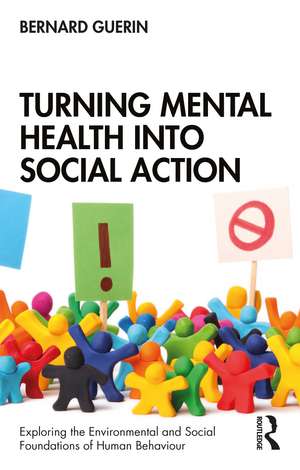Turning Mental Health into Social Action: Exploring the Environmental and Social Foundations of Human Behaviour
Autor Bernard Guerinen Limba Engleză Paperback – 20 iul 2020
‘Mental health’ behaviours are carefully analysed as ordinary behaviours which have become exaggerated and chronic because of the bad life situations people are forced to endure, especially as children. This shifts mental health treatments away from the dominance of psychology and psychiatry to show that social action is needed because many of these bad life situations are produced by our modern society itself. By providing new ways for readers to rethink everything they thought they knew about mental health issues and how to change them, Bernard Guerin also explores how by changing our environmental contexts (our local, societal, and discursive worlds), we can improve mental health interventions. This book reframes ‘mental health’ into a much wider social context to show how societal structures restrict our opportunities and pathways to produce bad life situations, and how we can also learn from those who manage to deal with the very same bad life situations through crime, bullying, exploitation, and dropping out of mainstream society, rather than through the ‘mental health’ behaviours.
By merging psychology and psychiatry into the social sciences, Guerin seeks to better understand how humans operate in their social, cultural, economic, patriarchal, discursive, and societal worlds, rather than being isolated inside their heads with a ‘faulty brain’, and this will provide fascinating reading for academics and students in psychology and the social sciences, and for counsellors and therapists.
| Toate formatele și edițiile | Preț | Express |
|---|---|---|
| Paperback (1) | 274.82 lei 43-57 zile | |
| Taylor & Francis – 20 iul 2020 | 274.82 lei 43-57 zile | |
| Hardback (1) | 995.58 lei 43-57 zile | |
| Taylor & Francis – 20 iul 2020 | 995.58 lei 43-57 zile |
Preț: 274.82 lei
Nou
Puncte Express: 412
Preț estimativ în valută:
52.60€ • 57.16$ • 44.22£
52.60€ • 57.16$ • 44.22£
Carte tipărită la comandă
Livrare economică 21 aprilie-05 mai
Preluare comenzi: 021 569.72.76
Specificații
ISBN-13: 9780367898151
ISBN-10: 0367898152
Pagini: 192
Ilustrații: 14
Dimensiuni: 138 x 216 x 13 mm
Greutate: 0.22 kg
Ediția:1
Editura: Taylor & Francis
Colecția Routledge
Seria Exploring the Environmental and Social Foundations of Human Behaviour
Locul publicării:Oxford, United Kingdom
ISBN-10: 0367898152
Pagini: 192
Ilustrații: 14
Dimensiuni: 138 x 216 x 13 mm
Greutate: 0.22 kg
Ediția:1
Editura: Taylor & Francis
Colecția Routledge
Seria Exploring the Environmental and Social Foundations of Human Behaviour
Locul publicării:Oxford, United Kingdom
Public țintă
Adult education, General, Postgraduate, and Undergraduate AdvancedCuprins
1. The hidden histories of clinical and therapeutic psychology 2. Contextualizing ‘mental health’ behaviours 3. What are the ‘bad situations’ which lead to the ‘mental health’ behaviours and other outcomes? 4. Contextualizing ‘mental health symptoms’ without diagnoses: Initial explorations 5. How can we change behaviour by changing local bad situations’? 6. How can we change language use and thinking in ‘mental health’? 7. How can we change behaviours shaped by the bad situations produced by societal structures of modernity? 8. Interventions for ‘mental health symptoms’ produced by colonization and patriarchal bad situations
Notă biografică
Bernard Guerin has worked in both Australia and New Zealand researching and teaching to merge psychology with the social sciences. His main research now focuses on contextualizing ‘mental health’ behaviours, working with Indigenous communities, and exploring social contextual analyses especially for language use and thinking.
Descriere
This book deconstructs modern talking therapies, and frames mental health in a wider social context to show how societal structures restrict our opportunities. It is part of a trilogy which offers a new way of doing psychology focusing on people’s social environments as determining their behaviour, rather than internal attributions.









